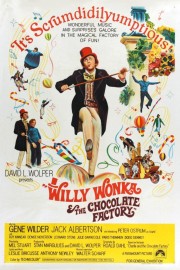Willy Wonka & the Chocolate Factory
When Tim Burton and Johnny Depp did their “reimagining” of Roald Dahl’s beloved tale, Charlie & the Chocolate Factory, almost ten years ago, I think it’s safe to say that even fans of the pairing were skeptical. Mel Stuart’s 1971 adaptation of the story looms so large in the memories of fans who watched it when they were growing up that, even if they didn’t necessarily love it, it nonetheless cast a spell on them. I think a lot of that is because of the genius of Gene Wilder, whose subversive brand of humor and humanity was perfect for the role of the enigmatic candymaker, Willy Wonka.
The story is well known by now. Willy Wonka is an iconic candymaker whose candy is enjoyed around the world, and allowed people to see his amazing factory. However, after other candy companies were sending spies into the factory to steal his secrets, Wonka closes his doors to the public, even though the chocolate and candy continues to come out. One day, Wonka announces a contest: hidden within five bars of his chocolate are five golden tickets, the finders of whom will get an exclusive tour of his factory, and a lifetime supply of chocolate. Oh, what a wonderful thing that would be for young Charlie Bucket (Peter Ostrum, in his first film, and a great performance), who lives in poverty with his mother and four grandparents. He can’t help but get caught up in the excitement, although he isn’t able to buy as many as other people are. Nonetheless, he manages to find one of the tickets, and with his Grandpa Joe (Jack Albertson), he sets off on an adventure that will change his life forever.
The film has the look and feel of a musical comedy out of the old studio system, and with a song score by Leslie Bricusse and Anthony Newley that is iconic even today, it’s justly become a family classic. But there’s quite a dark streak to this material, and it starts with Wonka. The film becomes a morality play of several types of greed, as each of the children succumb to the temptations Wonka presents, and to the possibility of becoming rich if they were to give in to the desires of Slugworth, a rival candymaker, who wants the secret of Wonka’s newest creation, the Everlasting Gobstopper. It’s also a work of bizarre surrealism once the action moves into the factory. A few years after Stanley Kubrick provided the “ultimate trip” with “2001: A Space Odyssey,” Stuart provides an equally unreal cinematic experience, and that’s just taking into account the Oompa-Loompas and the river of chocolate. The river ride through a tunnel, the soft drink that causes you to float, and the TV device that can transmit an actual candy bar through the television are just a few of the unique treats that Wonka has in store for Charlie, Veruca Salt, Mike Teevee, and the rest of the guests to his factory.
“Willy Wonka & the Chocolate Factory’s” lasting impact on viewers, though, comes from Wilder’s wonderful performance, one of the finest in movie history. There’s something about the great actor’s voice that just fits in to giving a wicked gleam to Willy Wonka, whose motivations are unknown for allowing people into his factory after so long. Wilder is a sly, intelligent talent who really thrived with eccentric, offbeat characters with a sarcastic streak, as Wonka shows again and again. This is a tour de force performance that cannot be duplicated in it’s originality, and while Depp did a fine job in the role in Burton’s film, there’s a lack of sentiment to Wilder’s characterization that makes him more human than the sideshow that Depp’s Wonka was. With Wilder, that world of “Pure Imagination” Wonka sings about in one of the film’s loveliest songs seems a lot closer than it feels at times.










